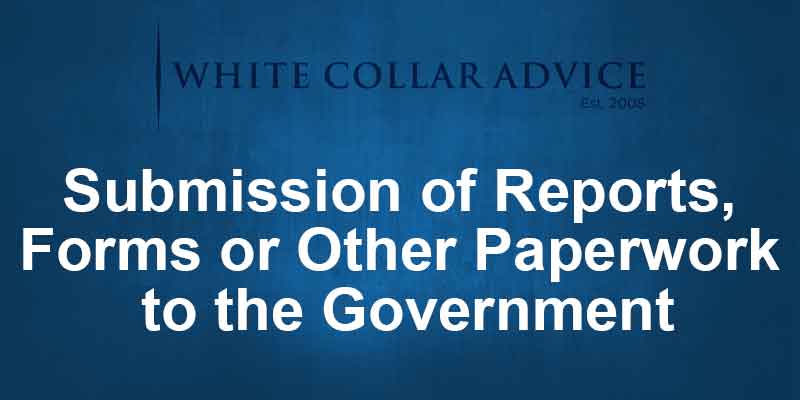Part 5 of 5 – When Law Enforcement Comes Knocking — What Are Your Options?
Submission of Reports, Forms or Other Paperwork to the Government and Conclusion
In Part 5, my final blog on dealing with the government, I’ll discuss how the submission of false paperwork to the government can get you in trouble, and then will provide a conclusion to my series.
Examples of False Written Statements Prosecutable Under Section 1001
In numerous situations, if you submit false paperwork to the government, you can be prosecuted for false statements under Section 1001 (18 United States Code Section 1001). I discussed the elements of Section 1001 in Part 2 of my blog. The following are some examples of situations in which the submission of false paperwork to the government could result in a Section 1001 violation and a criminal prosecution:
- False statements on federal forms (e.g., IRS, Immigration, SEC, Food & Drug Administration, Department of Defense, Federal Housing Administration)
- False invoices, certifications or appraisals in connection with work done for a government agency
- False statements in applications to obtain official federal documents (e.g., passports, social security cards)
- False statements in an application for federal employment
- False information on forms given to customs or border agents
The Criminal False Claims Statute
In addition to a Section 1001 charge, those who lie to the government when submitting invoices for work completed for the government could face a charge under the criminal false claims statute, 18 United States Code Section 287. This statute, entitled “False, Fictitious or Fraudulent Claims,” provides as follows:
Whoever makes or presents to any person or office in the civil, military, or naval service of the United States, or any department or agency thereof, knowing such claim to be false, fictitious, or fraudulent, shall be imprisoned not more than five years and shall be subject to a fine in the amount provided in this title.
The False Claims Act − Civil Cases
- The False Claims Act (“FCA”), 31 United States Code Section 3729, provides treble damages and civil penalties for any company or person who knowingly submits a false or fraudulent claim for payment or approval to the U.S.
- As an example, numerous FCA civil charges, as well as related criminal charges, have been filed over the past few years by the Department of Justice against large pharmaceutical companies, primarily for off-label promotion, Medicare/Medicaid fraud and kickbacks. These cases have resulted in the admission of FCA violations, guilty pleas to related criminal charges, and multi-billion dollar settlements.
- The FCA permits an individual, usually a former company employee, to file what is known as a qui tam action alleging that a company defrauded the federal government, and the government can then join in the lawsuit and take the lead in pursuing it. If the lawsuit succeeds, the individual can receive up to 30% of the amount awarded to the government.
Conclusion
Now you know why you need to be very careful when you either talk to or submit paperwork to the government. You must be truthful, and you can’t conceal or cover-up. So carefully consider whether it makes sense to even talk to the government, and make sure that any forms you or your company submit to the government are completely accurate.
If you fail to follow this advice, you do so at your own peril.
Contact Me Now If You Have Questions – Even if you are outside New York and New Jersey, I work with experienced white collar defense attorneys across the country. After we speak, I can make an introduction.
This blog is the fifth and final blog of the blogs that I have posted on the issue of government interviews and paperwork. If you’d like to learn more, please feel free to reach out to me at (212) 592-1513. I practice white collar criminal defense and securities and bank regulatory defense in New York, New Jersey and elsewhere, and my contact information is included in the link below.
LINK TO DAVID ROSENFIELD’S CONTACT INFORMATION
David Rosenfield
CNN Exclusive: Justin Paperny Analyzes Sam Bankman-Fried’s 25-Year Sentence
https://youtu.be/KgP_9aRrEZs I was saddened to hear Sam Bankman-Fried say his useful life is over. Many individuals facing prison share that sentiment, and I certainly did during my own experience. Navigating through such challenging times requires learning from those...
Breaking Down Sam Bankman-Fried’s Upcoming Sentencing
https://youtube.com/live/WC59hWkUUE8 Join me in this live session as I cover the upcoming sentencing hearing of Sam Bankman-Fried, scheduled for tomorrow before Judge Kaplan. As many of you are aware, the government is pushing for a hefty term of up to 50 years in...
Get Out Of Federal Prison Early!
If you are going to federal prison, we know you want out as quickly as possible. But how? https://youtube.com/live/2jTG3MexFog It starts with understanding stakeholders, including case managers. Case managers are key figures within this system, maintaining lists...
What’s Next for Peter Navarro at Miami Federal Prison Camp?
Following a CNN interview about Peter Navarro, I got many nasty Instagram messages and a phone call from someone claiming to be close to his family. Essentially, he called to reprimand me or give me the "411," as he said. To be clear, I don't think Peter Navarro...
White Collar Advice: Your Guide Through the Sentencing Journey
Hi Alec Burlakoff here, with White Collar Advice. I am writing to share insights on the sentencing journey. This morning, I had a talk with someone who felt like he was navigating through a storm without a compass when it came to sentencing and mitigation. It struck...
The Most DANGEROUS Thing In A Federal Prison Camp
https://youtube.com/shorts/KlWP-3VOVvo Federal Prison Camp My first day in federal prison included the basics: ProcessingObserving the layout of the campEating in the chow hallStanding for count You know the basics! Yet, it was during a seemingly mundane walk around...

